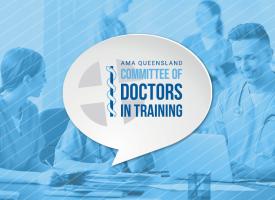Post Exam Stockholm Syndrome
Dr Bernadette Wilks, Deputy Co-Chair, Council of Doctors in Training, reflects on her experience post- fellowship exams:
"I recently passed my Fellowship exams after many years of arduous constant study, a journey many reading this will remember with mixed emotions. My success was greeted by many words of congratulations from family, friends and colleagues. But one response was not one of celebration but of warning. Warning that often, once the pressure of years of exams is removed, anxiety and or depression could follow. In fact, the friend who made me heed this warning did so from personal experience. For nearly six months after the completion of the very same training program’s fellowship examination, my friend’s life was dominated by low grade depression and anxiety. Not the sort that prevents high functioning at work; not the sort that prevents one from going about the usual business of life; but a depression that left them apathetic, unmotivated, tired, uninterested in socialising and constantly bored.

After pondering this warning, I recalled a number of situations where colleagues failed to thrive after the completion of their exams. The primary exam left a number of my friends depressed; a depression compounded by guilt that they felt depressed when they had passed an exam many had failed. Another friend struggled to socialise. Any social event left this friend either paralysed at the thought of meeting friends, or bored when they were in the company of others. I have witnessed many relationships end after the completion College exam. Another colleague experienced complete inertia. They were unable to complete small tasks such as journal club presentations or a low acuity audit. They struggled to complete simple everyday activities such as shopping, cleaning or paying bills.
A literature and Google search uncovered very little literature of substance on post-exam depression or anxiety and most were opinion pieces. The term ‘post-exam depression’ along with the acronym PED appeared intermittently. But this was in the context of university students leaving the social, educational and cultural network of university life and transitioning to the less exhilarating, more constrictive life of a working adult. PED shared some characteristics with stories shared by colleagues after their College exams but there was more to the mental health changes witnessed in my colleagues than adjusting to adult life.
An opinion piece published in the Australian and New Zealand College of Psychiatrist’s Australasian Psychiatry in 2010 titled Post-exam blues described the exact predicament my friend warned me about. The article bemoaned the lack of formalised criteria for the problem whose symptoms are subacute and unable to fulfil the criteria for conditions such as adjustment disorder, PTSD or demoralisation. Could the sudden withdrawal of stress hormones such as adrenalin and cortisol be the drivers behind the emotional changes post College exams? Or do some doctors suffer an existential crisis once the purpose, precision and predictability of day-to-day life are removed by passing an exam?
When speaking to friends and colleagues about their post-College exam experience, many alluded to a type of Stockholm syndrome where life was easier with the exam as the exam provided a daily purpose, schedule and goal. In other words, trainees developed dependency upon the captive states of exam lock down and negative feelings towards anything that distracted them from their study goals. The exam offered a valid excuse for not cleaning, paying bills, replying to messages or not attending a dinner. With the exam removed and time no longer an obsessive concern, it became unclear why answering an email, going out to dinner or making plans for a Sunday was distressing or challenging. Is our need to progress through and survive medical training stronger than our impulse to dislike the progress to the point that we leave? Or does our ‘ego under stress’ spin the endless ardours of training into sentimental feelings towards the medical profession, creating a bond with the very process that causes distress, anxiety and isolation?
Prevention of post-College exam depression and anxiety is limited by the lack of discourse around the prevalence, causation and definition of the phenomena. As a profession we need to expand our understanding of the impact of training beyond the immediacy of exam failure to the wholescale impact throughout College speciality training."
BY DR BERNADETTE WILKS, DEPUTY CO-CHAIR, COUNCIL OF DOCTORS-IN-TRAINING
This article was featured in Australian Medicine.



